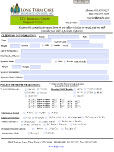Long-term care (LTC) refers to a variety of services designed to help people perform the functions of day-to-day living to help them remain independent. Long-Term Care Insurance, not to be confused with disability insurance, offers people a financial safety net designed to cover a wide range of long-term care services. If you are unable to care for yourself because of prolonged illness or disability, long-term care insurance may pay for the kind of services you need. Such services may include help with activities of daily living, home health care, respite care, adult day care, care in a nursing home or care in an assisted living facility.
Some long-term care is aimed at providing help with day-to-day activities for people with chronic illness, or cognitive impairment, such as dementia. Other long-term care services may be rehabilitative, helping someone regain function after a serious injury. Care is received in a variety of settings including nursing homes, alternate care facilities and a person's own home.
What exactly are my options when choosing the right policy?
 Choice is what we’re about at ShopHealthMN and we offer the easiest and most beneficial policies available. Our favorite is what we call the NEW GENERATION of long-term care policies, otherwise known as a cash benefit. With the usual policy, you must first incur the expense of long-term care in order to be reimbursed by the insurance provider. A NEW GENERATION policy offers you CASH deposited into your bank account upon doctor’s notice, after your deductible period, that you can’t perform two of the six activities of daily living.
Choice is what we’re about at ShopHealthMN and we offer the easiest and most beneficial policies available. Our favorite is what we call the NEW GENERATION of long-term care policies, otherwise known as a cash benefit. With the usual policy, you must first incur the expense of long-term care in order to be reimbursed by the insurance provider. A NEW GENERATION policy offers you CASH deposited into your bank account upon doctor’s notice, after your deductible period, that you can’t perform two of the six activities of daily living.
That’s it. No strings attached no exclusions and no restrictions. Spend the cash as you like, on the quality of services you prefer.
Who Should Consider Long-Term Care Insurance?

If you have assets to protect, but aren't wealthy enough to comfortably pay for long term care services out of your savings, you should be comparing long term care insurance policies now. It's especially important if there's a history of serious illness in your family.
It's also very important to apply while you still have your health. If you do not have a long term care policy when your health situation requires you to have one, most insurance companies will not issue you one. It might be too late.
Most think that they will only require long-term care services when the get older. While it is true that many receive long-term care services at an older age, there are 40% of individuals under age 65 receive long-term care services! So, it's not just for older individuals.
Long-Term Care policies are usually guaranteed renewable, meaning once you qualify, you'll remain eligible as long as you pay your premiums. This is another good reason to plan ahead? The premium is based on your age at the time you purchase the insurance - and could be locked in for the life of your policy depending on whether the insurance company raises rates.
Why buy Long-term Care?
- Protect Your Assets
- Preserve Your Independence
- Family
- Quality of Care
- Financial Safety Net
Paying For Long-Term Care

There are basically four ways of paying for LTC services.
- 1. Self-Insure
- 2. Medicaid
- 3. Medicare
- 4. Long-Term Care Insurance
1. Self-insuring means setting aside or having enough money to pay privately for future LTC services, if they become necessary. This plan may require a dedicated aggressive and immediate savings plan. It's impossible to know if or when these services will be needed, and that makes the target savings amount difficult to determine.
2. Medicaid, a joint federal-state government program for low income individuals, will provide coverage for long-term care expenses if your income and assets are very low or after you have exhausted almost all of your own assets. It is an entitlement program based on strict income and asset guidelines. You may be required to spend your own money for care, living expenses and other "allowable" expenses before becoming eligible for Medicaid. This is referred to as the "spend-down" period.
3. Medicare is the federal medical insurance program for people age 65 or older, and disabled persons of any age receiving Social Security benefits for not less than 24 months. It was designed to pay some of the costs of certain health care services in order to provide recipients access to a basic level of health care. The majority of care provided in the U.S. today in connection with chronic long-term illnesses or conditions is personal or custodial care and may be rehabilitative in some cases. Medicare will generally not pay for personal or custodial care.
4. Long-Term Care Insurance This is insurance designed to help pay for the cost of long-term care services if you need them. It is not the same as medical insurance, which generally provides coverage for doctor visits and hospital stays. Depending on the type of policy and coverage selected, long-term care insurance can provide coverage for long-term care in many settings: your own home, nursing homes, adult day care, and assisted living facilities.
Click here to download the Long-term care proposal request form.




 75% of all health care dollars are spent on patients with
one or more chronic conditions, many of which can be prevented, including diabetes, obesity, heart disease, lung disease, high blood pressure,
and cancer.
75% of all health care dollars are spent on patients with
one or more chronic conditions, many of which can be prevented, including diabetes, obesity, heart disease, lung disease, high blood pressure,
and cancer. 

